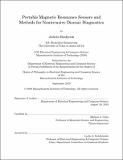| dc.contributor.advisor | Michael J. Cima. | en_US |
| dc.contributor.author | Bashyam, Ashvin(Ashvin Reddy) | en_US |
| dc.contributor.other | Massachusetts Institute of Technology. Department of Electrical Engineering and Computer Science. | en_US |
| dc.date.accessioned | 2020-03-09T18:58:31Z | |
| dc.date.available | 2020-03-09T18:58:31Z | |
| dc.date.copyright | 2019 | en_US |
| dc.date.issued | 2019 | en_US |
| dc.identifier.uri | https://hdl.handle.net/1721.1/124112 | |
| dc.description | This electronic version was submitted by the student author. The certified thesis is available in the Institute Archives and Special Collections. | en_US |
| dc.description | Thesis: Ph. D., Massachusetts Institute of Technology, Department of Electrical Engineering and Computer Science, 2019 | en_US |
| dc.description | Cataloged from student-submitted PDF version of thesis. | en_US |
| dc.description | Includes bibliographical references (pages 144-154). | en_US |
| dc.description.abstract | Many diseases manifest as a shift in fluids between distinct tissue fluid compartments. For example, fluid depletion and fluid overload lead to a deficit or accumulation of fluids within the intramuscular interstitial space. A direct measurement of these fluid shifts could serve as a highly specific diagnostic or prognostic tool to improve clinical management of these disorders. Proton magnetic resonance is exquisitely sensitive to the local physical and chemical environment of water molecules within the body. Therefore, we hypothesized that localized magnetic resonance (MR) measurements could interrogate local tissue fluid distributions and assess systemic fluid volume status. This thesis explored the potential for a portable MR sensor to characterize shifts in tissue fluid distribution and identify the onset and progression of fluid volume status disorders. | en_US |
| dc.description.abstract | First, we designed a portable, single sided MR sensor capable of performing remote measurements of the multicomponent T2 signal originating from distinct fluid compartments. Further, we present a design framework to create single sided sensors with magnetic field strength and geometry suitable for a wide range of applications. We then demonstrate that a localized measure of tissue fluid distribution using a portable MR sensor is capable of identifying systemic changes in fluid volume status associated with fluid depletion. We validate these findings via whole animal MR measurements and a standard MRI scanner capable of localizing its measurement towards the muscle tissue. Finally, we explore new strategies to enable the translation of these portable MR sensors towards humans. | en_US |
| dc.description.abstract | We demonstrate techniques combining multicomponent T2 relaxometry, depth-resolved measurements, and diffusion-weighted pulse sequences to improve identification of fluid shifts within muscle tissue despite the presence of confounding tissues, such as the subcutaneous tissue. The magnetic resonance sensors and measurement techniques developed here lay the foundations for a non-invasive, portable, and quantitative indicator of tissue fluid distribution. This technology has the potential to serve as a clinical diagnostic for both localized and systemic fluid imbalances. Furthermore, these approaches enabling portable, quantitative MR measurements can be extended to the diagnosis and staging of the progression of other diseases which exhibit shifts in fluid distributions. | en_US |
| dc.description.statementofresponsibility | by Ashvin Bashyam. | en_US |
| dc.format.extent | 154 pages | en_US |
| dc.language.iso | eng | en_US |
| dc.publisher | Massachusetts Institute of Technology | en_US |
| dc.rights | MIT theses are protected by copyright. They may be viewed, downloaded, or printed from this source but further reproduction or distribution in any format is prohibited without written permission. | en_US |
| dc.rights.uri | http://dspace.mit.edu/handle/1721.1/7582 | en_US |
| dc.subject | Electrical Engineering and Computer Science. | en_US |
| dc.title | Portable magnetic resonance sensors and methods for noninvasive disease diagnostics | en_US |
| dc.type | Thesis | en_US |
| dc.description.degree | Ph. D. | en_US |
| dc.contributor.department | Massachusetts Institute of Technology. Department of Electrical Engineering and Computer Science | en_US |
| dc.identifier.oclc | 1142101313 | en_US |
| dc.description.collection | Ph.D. Massachusetts Institute of Technology, Department of Electrical Engineering and Computer Science | en_US |
| dspace.imported | 2020-03-09T18:58:30Z | en_US |
| mit.thesis.degree | Doctoral | en_US |
| mit.thesis.department | EECS | en_US |
